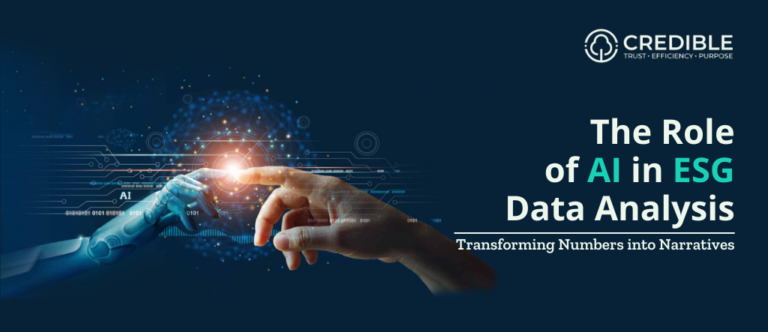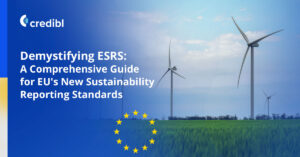In today’s fast-paced corporate world, Environmental, Social, and Governance (ESG) data is the name of the game. Companies are inundated with vast amounts of ESG data, from carbon emissions to employee diversity statistics. However, the real challenge lies in extracting meaningful insights from this data deluge. This is where Artificial Intelligence (AI) steps in, playing a central role in reshaping the ESG landscape.
The Data Deluge: ESG Information Overload
The growth of ESG data is nothing short of exponential. According to recent reports, ESG data has grown at an annual rate of 34%, with over 80% of S&P 500 companies now publishing sustainability reports. This sheer volume of data presents a significant hurdle for corporations attempting to navigate the ESG landscape. Manual data processing is no longer viable, and this is where AI comes into play.
AI is the antidote to ESG information overload. Its ability to process and analyze vast datasets at lightning speed is unparalleled. This enables companies to gain insights from ESG data that would be impossible to achieve through traditional means. According to a report by the Global Reporting Initiative (GRI), the number of companies reporting on ESG metrics has increased by over 300% in the past decade. This growth is expected to continue, with more and more companies recognizing the importance of ESG data.
AI’s Emergence in ESG Data Analysis
Artificial Intelligence encompasses a range of technologies, including Natural Language Processing (NLP) and predictive analytics, which are revolutionizing ESG data analysis. NLP allows AI to interpret unstructured data, such as social media sentiment or qualitative reports, turning it into quantifiable insights. Predictive analytics, on the other hand, uses historical data to forecast future ESG trends. This is particularly valuable for proactive decision-making and risk management.
Credible, as one of the premier ESG advisory and technology platforms, has developed an AI-enabled reporting platform that employs machine learning algorithms for ESG data analysis. This cutting-edge platform empowers diverse sustainable businesses and investors alike, facilitating well-informed decision-making by furnishing them with invaluable insights into the ESG performance of companies.
Transforming Numbers into Narratives
One of the most exciting aspects of AI in ESG analysis is its ability to transform raw data into compelling narratives. Visualization tools and techniques, driven by AI algorithms, turn complex data into easily digestible visuals. These visuals tell a story, making it easier for stakeholders to understand the implications of ESG data. AI-driven charts and graphs can illustrate how a company’s sustainability efforts have led to reduced carbon emissions or improved workplace diversity.
A great example of this is Microsoft’s “AI for Earth” program, which uses AI technologies to help organizations tackle environmental challenges. Through this program, Microsoft provides grants and technical support to organizations working on projects related to climate change, agriculture, biodiversity, and water conservation.
Redefining Corporate Strategies
The integration of AI insights into corporate ESG strategies is transformative. By identifying risks and opportunities through AI analysis, corporations can tailor their strategies for maximum impact. This not only enhances sustainability but also drives shareholder value and mitigates potential ESG-related crises.
However, it’s not all sunshine and rainbows. Ethical considerations and potential pitfalls loom in the AI-powered ESG landscape. Bias in AI algorithms and data privacy concerns must be carefully addressed to ensure the ethical use of AI in ESG analysis. It should also validate data to ensure accuracy, culminating in actionable insights and visually comprehensible reports. These resources enable stakeholders to grasp their current ESG footprint and identify future opportunities.
The Future of Sustainable Investing
As the world turns its focus toward sustainability, AI-powered investment decisions are becoming more prevalent, as algorithms assess a company’s ESG performance and potential long-term sustainability.
For example, AI can help investors identify companies that are not only profitable but also environmentally and socially responsible. This synergy between AI and sustainability goals positions companies for long-term success in an ESG-conscious world.
A recent study by MSCI found that companies with strong ESG performance tend to outperform their peers in terms of financial performance. This suggests that sustainable investing strategies powered by AI can not only help investors achieve their sustainability goals but also generate strong returns.
Conclusion
In the ever-evolving world of ESG data analysis, AI is not just an option—it’s a necessity. The transformative power of AI in turning numbers into narratives, reshaping corporate strategies, and driving sustainable investments is undeniable.
As we move forward, it’s essential for companies to embrace AI in their ESG initiatives. Collaboration between humans and AI, coupled with a commitment to ethical AI practices, will be the key to harnessing the full potential of AI in ESG data analysis.
So, as you navigate the vast sea of ESG data, remember that an AI-powered platform is your trusted co-pilot, helping you not only stay afloat but also sail toward a more sustainable and prosperous future.







